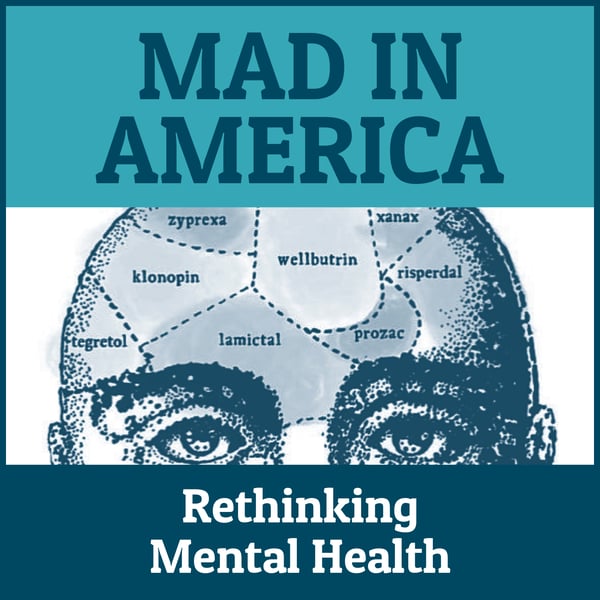Psychology’s Small Stories and the Call of the Other: An Interview with David Goodman
Mad in America: Rethinking Mental Health
Mad in America
4.8 • 201 Ratings
🗓️ 9 April 2025
⏱️ 43 minutes
🧾️ Download transcript
Summary
David Goodman is the Director of the Center for Psychological Humanities and Ethics and the Dean of the Woods College of Advancing Studies at Boston College, where he also teaches in the Department of Formative Education.
A past president of the APA’s Society for Theoretical and Philosophical Psychology (Division 24), Goodman is known for his interdisciplinary work at the intersection of psychology, philosophy, theology, and ethics. He is the founder of the Psychology and the Other conference series and serves as editor of two book series: Psychology and the Other and Essays in the Psychological Humanities.
In this conversation, Goodman draws on the work of philosopher Emmanuel Levinas to reimagine therapy not as a space for self-optimization but as an encounter with responsibility—a call to become more available, interruptible, and open to the world beyond ourselves. He reflects on psychology’s history of centering the individual at the expense of the relational, critiques the structural limitations imposed by managed care systems, and shares clinical insights from his own practice.
He explores how therapy can become a site of ethical awakening rather than adjustment, and how the dominant metaphors of psychology (often drawn from consumer culture and medicine) may obscure the relational depth of human life.
***
Thank you for being with us to listen to the podcast and read our articles this year. MIA is funded entirely by reader donations. If you value MIA, please help us continue to survive and grow. https://www.madinamerica.com/donate/
To find the Mad in America podcast on your preferred podcast player, click here: https://pod.link/1212789850
© Mad in America 2025. Produced by James Moore https://www.jmaudio.org
Transcript
Click on a timestamp to play from that location
| 0:00.0 | Welcome to the Madden America podcast, your source for science, psychiatry, and social justice. |
| 0:14.4 | Hello everyone, and welcome to Mad in America. Our guest today is David Goodman, President |
| 0:19.7 | elect of APA's Division 24. David is |
| 0:22.9 | firstly a renowned clinician. He's also the associate dean at Lynch School and Dean of Woods |
| 0:27.6 | College of Advancing Studies, both at Boston College. In the past, he has served as |
| 0:33.0 | director of the Center for Psychological Humanities and Ethics. David has taught at Leslie University |
| 0:38.7 | and at Howard Medical School, among other places. He also started the psychology and the other |
| 0:44.4 | annual conferences, which is how I know him, and he's editor of the book series by the same name. |
| 0:50.7 | Official positions and accolades aside, David's work is actually far more intimate and human. |
| 0:57.4 | It's about how we understand ourselves, our suffering, and how we respond to that in other people. |
| 1:04.1 | So eventually, it becomes about practicing a very different kind of therapy, which is why I introduced him as a clinician, first and foremost. |
| 1:12.6 | David, welcome to Matt in America. |
| 1:14.7 | Thank you. It's such a pleasure to be here with you. |
| 1:16.8 | A lot of what you have written is about the other, as opposed to the self, which is what |
| 1:22.9 | psychology is normally concerned with. The self is a big thing in psychological |
| 1:28.5 | literature. Could you tell us why this interest in the other, the needs of the other, lives, |
| 1:35.4 | their devastations? Was it an academic curiosity? Was it a personal journey? Partly both? |
| 1:42.2 | What was it about? Well, it's an excellent question. And again, thank you for hosting me. And I'm excited to have |
| 1:48.3 | this dialogue with you. You know, I find the question to be a really interesting one. |
| 1:52.4 | You know, why a focus on the other as opposed to the self? Because I would almost want to |
| 1:56.9 | reverse the question and say, why such a preoccupation with the self and why have we built an |
| 2:03.7 | entire discipline that explores humanity with the exclusion of the other when you think about what the |
... |
Please login to see the full transcript.
Disclaimer: The podcast and artwork embedded on this page are from Mad in America, and are the property of its owner and not affiliated with or endorsed by Tapesearch.
Generated transcripts are the property of Mad in America and are distributed freely under the Fair Use doctrine. Transcripts generated by Tapesearch are not guaranteed to be accurate.
Copyright © Tapesearch 2025.

